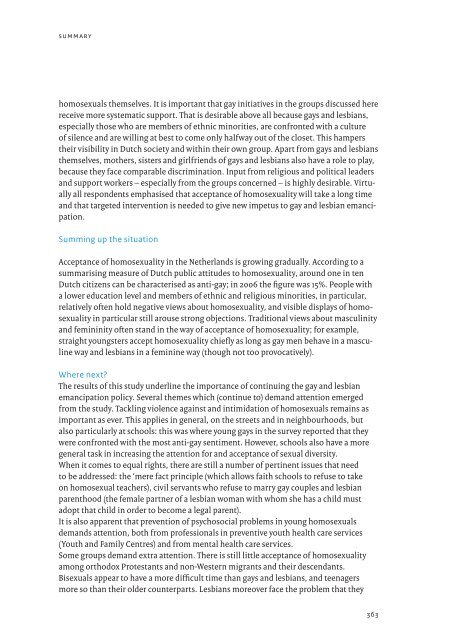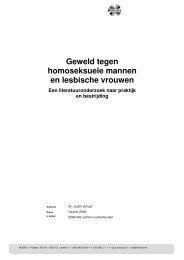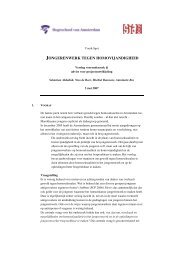- Page 1:
Steeds gewoner, nooit gewoon
- Page 4 and 5:
Het Sociaal en Cultureel Planbureau
- Page 6 and 7:
steeds gewoner, nooit gewoon 3.3.3
- Page 8 and 9:
steeds gewoner, nooit gewoon 9 Acce
- Page 10 and 11:
steeds gewoner, nooit gewoon 13.7.4
- Page 12 and 13:
steeds gewoner, nooit gewoon deel 5
- Page 14 and 15:
steeds gewoner, nooit gewoon Samenv
- Page 16 and 17:
steeds gewoner, nooit gewoon moeten
- Page 18 and 19:
steeds gewoner, nooit gewoon Homo-
- Page 20 and 21:
steeds gewoner, nooit gewoon geblek
- Page 22 and 23:
steeds gewoner, nooit gewoon Mogeli
- Page 24 and 25:
steeds gewoner, nooit gewoon 1 Gewo
- Page 26 and 27:
steeds gewoner, nooit gewoon Daarin
- Page 28 and 29:
steeds gewoner, nooit gewoon Ervari
- Page 31:
deel 1 Houding van de Nederlandse b
- Page 34 and 35:
steeds gewoner, nooit gewoon hun le
- Page 36 and 37:
steeds gewoner, nooit gewoon Sinds
- Page 38 and 39:
steeds gewoner, nooit gewoon Figuur
- Page 40 and 41:
steeds gewoner, nooit gewoon 2.3 De
- Page 42 and 43:
steeds gewoner, nooit gewoon De vie
- Page 44 and 45:
steeds gewoner, nooit gewoon Gelijk
- Page 46 and 47:
steeds gewoner, nooit gewoon We zul
- Page 48 and 49:
steeds gewoner, nooit gewoon schole
- Page 50 and 51:
steeds gewoner, nooit gewoon Tabel
- Page 52 and 53:
steeds gewoner, nooit gewoon vergar
- Page 54 and 55:
steeds gewoner, nooit gewoon 3 ‘W
- Page 56 and 57:
steeds gewoner, nooit gewoon Ook au
- Page 58 and 59:
steeds gewoner, nooit gewoon Ik vin
- Page 60 and 61:
steeds gewoner, nooit gewoon 3.2.4
- Page 62 and 63:
steeds gewoner, nooit gewoon Afghaa
- Page 64 and 65:
steeds gewoner, nooit gewoon Interv
- Page 66 and 67:
steeds gewoner, nooit gewoon duidel
- Page 68 and 69:
steeds gewoner, nooit gewoon niveau
- Page 70 and 71:
steeds gewoner, nooit gewoon vrouwe
- Page 72 and 73:
steeds gewoner, nooit gewoon agress
- Page 74 and 75:
steeds gewoner, nooit gewoon Tegeli
- Page 77:
deel 2 Ervaringen van lesbische vro
- Page 80 and 81:
steeds gewoner, nooit gewoon Driekw
- Page 82 and 83:
steeds gewoner, nooit gewoon Figuur
- Page 84 and 85:
steeds gewoner, nooit gewoon Tabel
- Page 86 and 87:
steeds gewoner, nooit gewoon De uit
- Page 88 and 89:
steeds gewoner, nooit gewoon Tabel
- Page 90 and 91:
steeds gewoner, nooit gewoon kantte
- Page 92 and 93:
steeds gewoner, nooit gewoon rappor
- Page 94 and 95:
steeds gewoner, nooit gewoon 5 Erva
- Page 96 and 97:
steeds gewoner, nooit gewoon Tabel
- Page 98 and 99:
steeds gewoner, nooit gewoon 5.2.3
- Page 100 and 101:
steeds gewoner, nooit gewoon leefsi
- Page 102 and 103:
steeds gewoner, nooit gewoon Alhoew
- Page 104 and 105:
steeds gewoner, nooit gewoon 6 Homo
- Page 106 and 107:
steeds gewoner, nooit gewoon ze bov
- Page 108 and 109:
steeds gewoner, nooit gewoon de ide
- Page 110 and 111:
steeds gewoner, nooit gewoon Tijden
- Page 112 and 113:
steeds gewoner, nooit gewoon mannen
- Page 114 and 115:
steeds gewoner, nooit gewoon kinder
- Page 116 and 117:
steeds gewoner, nooit gewoon ouders
- Page 119:
deel 3 Ervaringen van homoseksuele
- Page 122 and 123:
steeds gewoner, nooit gewoon Negati
- Page 124 and 125:
steeds gewoner, nooit gewoon ren he
- Page 126 and 127:
steeds gewoner, nooit gewoon zicht
- Page 128 and 129:
steeds gewoner, nooit gewoon Religi
- Page 130 and 131:
steeds gewoner, nooit gewoon Tabel
- Page 132 and 133:
steeds gewoner, nooit gewoon 8 Homo
- Page 134 and 135:
steeds gewoner, nooit gewoon Tabel
- Page 136 and 137:
steeds gewoner, nooit gewoon Tabel
- Page 138 and 139:
steeds gewoner, nooit gewoon Figuur
- Page 140 and 141:
steeds gewoner, nooit gewoon 140 He
- Page 142 and 143:
steeds gewoner, nooit gewoon 8.2.5
- Page 144 and 145:
steeds gewoner, nooit gewoon 1993;
- Page 146 and 147:
steeds gewoner, nooit gewoon Tabel
- Page 148 and 149:
steeds gewoner, nooit gewoon werkin
- Page 150 and 151:
steeds gewoner, nooit gewoon 8.4 Ho
- Page 152 and 153:
steeds gewoner, nooit gewoon 8.5 Sa
- Page 154 and 155:
steeds gewoner, nooit gewoon 9 Acce
- Page 156 and 157:
steeds gewoner, nooit gewoon Tabel
- Page 158 and 159:
steeds gewoner, nooit gewoon Er is
- Page 160 and 161:
steeds gewoner, nooit gewoon Tabel
- Page 162 and 163:
steeds gewoner, nooit gewoon Tabel
- Page 164 and 165:
steeds gewoner, nooit gewoon Tabel
- Page 166 and 167:
steeds gewoner, nooit gewoon De bev
- Page 168 and 169:
steeds gewoner, nooit gewoon 168 mo
- Page 170 and 171:
steeds gewoner, nooit gewoon In de
- Page 172 and 173:
steeds gewoner, nooit gewoon hebben
- Page 174 and 175:
steeds gewoner, nooit gewoon 10 Psy
- Page 176 and 177:
steeds gewoner, nooit gewoon Tabel
- Page 178 and 179:
steeds gewoner, nooit gewoon 178 In
- Page 180 and 181:
steeds gewoner, nooit gewoon goede
- Page 182 and 183:
steeds gewoner, nooit gewoon Figuur
- Page 184 and 185:
steeds gewoner, nooit gewoon nergen
- Page 186 and 187:
steeds gewoner, nooit gewoon die ie
- Page 188 and 189:
steeds gewoner, nooit gewoon 188 In
- Page 190 and 191:
steeds gewoner, nooit gewoon Uit gr
- Page 192 and 193:
steeds gewoner, nooit gewoon De res
- Page 194 and 195:
steeds gewoner, nooit gewoon coming
- Page 196 and 197:
steeds gewoner, nooit gewoon Er zij
- Page 198 and 199:
steeds gewoner, nooit gewoon want v
- Page 200 and 201:
steeds gewoner, nooit gewoon en heb
- Page 202 and 203:
steeds gewoner, nooit gewoon van id
- Page 204 and 205:
steeds gewoner, nooit gewoon gewees
- Page 206 and 207:
steeds gewoner, nooit gewoon bij de
- Page 208 and 209:
steeds gewoner, nooit gewoon Tabel
- Page 211 and 212:
12 Minderheden over minderheden Ger
- Page 213 and 214:
minderheden over minderheden homoma
- Page 215 and 216:
minderheden over minderheden over j
- Page 217 and 218:
minderheden over minderheden de Chi
- Page 219 and 220:
minderheden over minderheden kunnen
- Page 221 and 222:
na asten de Gereformeerde Bond. Maa
- Page 223 and 224:
na asten de drie kende inmiddels op
- Page 225 and 226:
na asten Toen ontbrandde in vrijgem
- Page 227 and 228:
na asten Om een beeld te krijgen va
- Page 229 and 230:
na asten speelruimte: ‘Men liet h
- Page 231 and 232:
na asten Enerzijds ‘Wij hebben ee
- Page 233 and 234:
na asten vraagd. Niet omdat ze voor
- Page 235 and 236:
na asten Volgens sommige behoudende
- Page 237 and 238:
na asten meerde kerkgenootschappen
- Page 239 and 240:
na asten voorkomen’ tot of tot en
- Page 241 and 242:
na asten niet leidt tot ‘exorcism
- Page 243 and 244:
na asten 22 Het vraagteken in de ti
- Page 245 and 246:
na asten naam geb. kerkgen. pw Piet
- Page 247 and 248:
leven en l aten leven. surina amse
- Page 249 and 250:
leven en l aten leven. surina amse
- Page 251 and 252:
leven en l aten leven. surina amse
- Page 253 and 254:
leven en l aten leven. surina amse
- Page 255 and 256:
leven en l aten leven. surina amse
- Page 257 and 258:
leven en l aten leven. surina amse
- Page 259 and 260:
leven en l aten leven. surina amse
- Page 261 and 262:
leven en l aten leven. surina amse
- Page 263 and 264:
leven en l aten leven. surina amse
- Page 265 and 266:
‘gewurgd door taboes’ 15 ‘Gew
- Page 267 and 268:
‘gewurgd door taboes’ Ik denk,
- Page 269 and 270:
‘gewurgd door taboes’ Uit eerde
- Page 271 and 272:
‘gewurgd door taboes’ religieuz
- Page 273 and 274:
‘gewurgd door taboes’ Tien jaar
- Page 275 and 276:
‘gewurgd door taboes’ Een gunst
- Page 277 and 278:
‘gewurgd door taboes’ bloed:
- Page 279 and 280:
‘gewurgd door taboes’ Met die '
- Page 281 and 282:
‘gewurgd door taboes’ aard zijn
- Page 283 and 284:
‘gewurgd door taboes’ schap te
- Page 285 and 286:
‘gewurgd door taboes’ 17 Ondank
- Page 287 and 288:
als er ma ar niet openlijk over ges
- Page 289 and 290:
als er ma ar niet openlijk over ges
- Page 291 and 292:
als er ma ar niet openlijk over ges
- Page 293 and 294:
als er ma ar niet openlijk over ges
- Page 295 and 296:
als er ma ar niet openlijk over ges
- Page 297 and 298:
als er ma ar niet openlijk over ges
- Page 299 and 300:
als er ma ar niet openlijk over ges
- Page 301 and 302:
als er ma ar niet openlijk over ges
- Page 303 and 304:
als er ma ar niet openlijk over ges
- Page 305 and 306:
17 Binnenlandse zaken; Chinese Nede
- Page 307 and 308:
innenl andse zaken; chinese nederl
- Page 309 and 310:
innenl andse zaken; chinese nederl
- Page 311 and 312: innenl andse zaken; chinese nederl
- Page 313 and 314: innenl andse zaken; chinese nederl
- Page 315 and 316: innenl andse zaken; chinese nederl
- Page 317 and 318: innenl andse zaken; chinese nederl
- Page 319 and 320: innenl andse zaken; chinese nederl
- Page 321 and 322: de k ast op een kier en Turkse Nede
- Page 323 and 324: de k ast op een kier homoseksualite
- Page 325 and 326: de k ast op een kier Dat stelt hen
- Page 327 and 328: de k ast op een kier vooral onmanne
- Page 329 and 330: de k ast op een kier kunnen permitt
- Page 331 and 332: de k ast op een kier Nichten, zemel
- Page 333: deel 5 Slot
- Page 336 and 337: steeds gewoner, nooit gewoon Veel a
- Page 338 and 339: steeds gewoner, nooit gewoon respon
- Page 340 and 341: steeds gewoner, nooit gewoon 19.3 G
- Page 342 and 343: steeds gewoner, nooit gewoon deelna
- Page 344 and 345: steeds gewoner, nooit gewoon te mak
- Page 346 and 347: steeds gewoner, nooit gewoon juist
- Page 348 and 349: steeds gewoner, nooit gewoon Biseks
- Page 350 and 351: steeds gewoner, nooit gewoon Het is
- Page 352 and 353: steeds gewoner, nooit gewoon maatsc
- Page 354 and 355: steeds gewoner, nooit gewoon Noten
- Page 356 and 357: steeds gewoner, nooit gewoon three
- Page 358 and 359: steeds gewoner, nooit gewoon the su
- Page 360 and 361: steeds gewoner, nooit gewoon Many y
- Page 364 and 365: steeds gewoner, nooit gewoon are la
- Page 366 and 367: steeds gewoner, nooit gewoon Biblar
- Page 368 and 369: steeds gewoner, nooit gewoon Brenni
- Page 370 and 371: steeds gewoner, nooit gewoon Dubois
- Page 372 and 373: steeds gewoner, nooit gewoon Heerin
- Page 374 and 375: steeds gewoner, nooit gewoon Kuyper
- Page 376 and 377: steeds gewoner, nooit gewoon Sandfo
- Page 378 and 379: steeds gewoner, nooit gewoon Vonk,
- Page 380 and 381: steeds gewoner, nooit gewoon 2009/1
- Page 382: steeds gewoner, nooit gewoon Social




